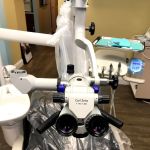How to Become a Dentist in the United States
Becoming a dentist is a journey that requires dedication, hard work, and a passion for helping others maintain their oral health. When I first thought about becoming a dentist, I didn’t know exactly what steps were involved. Over the years, I’ve learned that it’s a challenging yet rewarding profession. If you’ve ever wondered what it takes to become a dentist in the United States, I’m here to share the step-by-step process from my personal experience and the research I've done along the way.
1. Start with a Strong Educational Foundation
The first step on the path to becoming a dentist is to build a solid foundation in education. This means focusing on your high school studies and excelling in subjects like biology, chemistry, and mathematics. While dental school doesn’t require a specific high school diploma, it’s essential to develop a strong understanding of science and mathematics to succeed in the later stages of your education.
After high school, you’ll need to pursue a bachelor's degree from an accredited college or university. Most dental schools do not require a specific major, but it is highly recommended that you major in a science-related field such as biology, chemistry, or even health sciences. During your undergraduate years, you will need to complete prerequisite courses in subjects like anatomy, physiology, and biochemistry to prepare for dental school.
2. Gain Experience and Volunteer
Dental schools are competitive, and getting in requires more than just strong grades. As I was preparing to apply, I realized the importance of gaining experience in the dental field. Volunteering or shadowing a dentist is an excellent way to get a feel for the profession and demonstrate your commitment to becoming a dentist. Many dental schools require applicants to have a certain number of hours shadowing or volunteering with a practicing dentist. This experience not only looks great on your application but also gives you a firsthand look at what working in the dental field really involves.
3. Take the Dental Admission Test (DAT)
Before you can apply to dental school, you will need to take the Dental Admission Test (DAT). The DAT is a standardized exam that assesses your knowledge in areas such as biology, general chemistry, perceptual ability, and reading comprehension. It’s an essential step in the application process, and many dental schools place significant weight on your DAT scores. I spent months preparing for the DAT, and I recommend taking a prep course to ensure that you perform your best on the test.
4. Apply to Dental School
Once you’ve completed your undergraduate degree and taken the DAT, you can begin applying to dental schools. The application process can be lengthy, requiring you to submit transcripts, letters of recommendation, and a personal statement. I remember feeling overwhelmed by the number of requirements, but I also knew that this was a crucial step in achieving my goal of becoming a dentist. Make sure to research dental schools thoroughly and choose the ones that align with your values, location preferences, and specialty interests.
5. Complete Dental School
Once you’ve been accepted into dental school, you’re in for an intense but exciting four years of education and training. Dental school combines classroom learning with hands-on clinical experience. You’ll study subjects like dental anatomy, radiology, pathology, and oral surgery while also treating patients under the supervision of licensed faculty. Dental school is demanding, but it’s also one of the most rewarding experiences. You’ll learn the skills necessary to diagnose and treat a wide range of dental conditions, all while developing your professional network.
6. Get Licensed
After you graduate from dental school, you need to become licensed to practice as a dentist in the United States. Licensing requirements vary from state to state, but all states require passing both a written and a practical exam. The written exam typically consists of the National Board Dental Examinations (NBDE) or the Integrated National Board Dental Examination (INBDE). The practical exam tests your clinical skills by having you perform dental procedures on patients.
Once you’ve passed your exams and completed any other state-specific requirements, you will receive your dental license. This is a significant milestone in your journey to becoming a dentist, and it’s the point at which you can begin your career in the field.
7. Consider Specialization
As you begin your career as a dentist, you might find that you’re drawn to a particular area of dentistry, such as orthodontics, periodontics, or oral surgery. Specialization requires additional training and education, often in the form of a residency program. I considered specializing in orthodontics but ultimately chose general dentistry, as it allowed me to work with a wide variety of patients and conditions. If you’re passionate about a specific area of dentistry, pursuing a specialization can offer additional job opportunities and the chance to focus on the areas you love.
8. Continuous Education and Growth
Even after you become a licensed dentist, the learning doesn’t stop. Dentistry is a constantly evolving field, with new technologies, techniques, and treatments emerging regularly. To stay up to date and continue providing the best care for your patients, you’ll need to engage in continuing education throughout your career. This can involve attending conferences, taking specialized courses, and even pursuing advanced certifications in specific areas of dentistry.
In my own career, I’ve found that continuing education has been key to staying passionate about my work. It allows me to offer the best possible care to my patients and to keep growing professionally. Dentistry is a field where you can always improve and learn, which is one of the reasons I love it.
9. Build Your Practice or Join a Dental Group
As a new dentist, you can either join an established dental practice or start your own. Joining a dental group can provide mentorship and help you build a strong professional network, while starting your own practice offers more independence. I started by working with an established dentist and eventually decided to open my own practice. This journey was challenging but ultimately rewarding, and I’ve been able to create a dental office that reflects my values and vision.
Becoming a dentist is a challenging and rewarding path that requires years of dedication, education, and hard work. However, the opportunity to help others maintain their oral health and improve their lives is incredibly fulfilling. If you’re passionate about oral health and enjoy working with people, a career in dentistry could be the perfect fit for you.







 Dr. Samantha L. Greer, DDS, PA3.0 (25 review)
Dr. Samantha L. Greer, DDS, PA3.0 (25 review) Russo Family Dental4.0 (16 review)
Russo Family Dental4.0 (16 review) Dr. George Diaz, DDS5.0 (91 review)
Dr. George Diaz, DDS5.0 (91 review) Michael Tabbah, D.M.D.5.0 (2 review)
Michael Tabbah, D.M.D.5.0 (2 review) South Shore Dental Care: Dory Stutman, DDS5.0 (7 review)
South Shore Dental Care: Dory Stutman, DDS5.0 (7 review) Kathleen Schultz, DMD0.0 (0 review)
Kathleen Schultz, DMD0.0 (0 review) The Importance of Oral Health Education During Pregnancy for a Healthy Pregnancy
The Importance of Oral Health Education During Pregnancy for a Healthy Pregnancy Best Tips for Brushing Your Teeth Properly for Healthy Gums: Essential Techniques for Oral Health
Best Tips for Brushing Your Teeth Properly for Healthy Gums: Essential Techniques for Oral Health Why Skipping Dental Checkups Can Lead to Bigger Oral Health Problems
Why Skipping Dental Checkups Can Lead to Bigger Oral Health Problems Advantages of Porcelain Dental Restorations
Advantages of Porcelain Dental Restorations How Can Diabetes Cause Tooth and Gum Problems? Preventing and Managing Oral Health Issues
How Can Diabetes Cause Tooth and Gum Problems? Preventing and Managing Oral Health Issues Healthy Habits for Promoting Good Oral Health and Hygiene: Tips for a Healthy Smile
Healthy Habits for Promoting Good Oral Health and Hygiene: Tips for a Healthy Smile